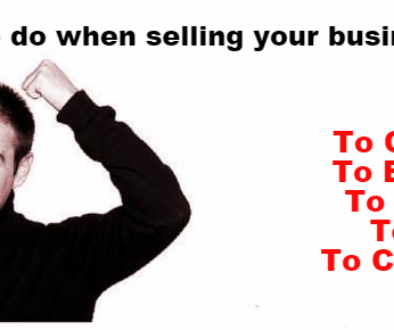Buying A Business – The Sequence of Events
Step 1: Self Assessment
When you meet with a Business Broker, be prepared to discuss your background, work experience and financial ability to purchase a business. A Business Broker cannot adequately help you find a company that meets your needs without this knowledge.
A personal resume and financial statement will also be required by lenders, landlords and others who will be a party to your business acquisition.
The following are examples of the questions you may be asked by a Business Broker:
- Why do you want to buy a business?
- What are your special skills and educational background?
- What is your work and/or business ownership experience?
- What are your hobbies and areas of special interests?
- Assuming suitable sources of financing are available, what is the maximum amount of your personal funds you can invest as a down payment to purchase a business?
- If you plan on including an equity partner/investor, how much do you expect them to invest of their personal funds?
Step 2: Define Your Acquisition Criteria
- Which business categories are of most interest to you? (Service, Retail, Wholesale/Distribution, Manufacturing, Restaurant/Fast Food)
- Is there a specific type of business that you are interested in purchasing?
- If you are not sure of the type of business you want, are there any businesses you do not want to purchase?
- What is the minimum income you require from a business to meet your living expenses?
- What is your preference for the location of a business?
- How far are you willing to commute for a good business?
Step 3: Review Businesses For Sale
Prior to receiving information on specific businesses for sale, you will be asked to sign a Nondisclosure / Confidentiality Agreement wherein you agree to keep all non public information confidential, and you agree to not do anything that would be disruptive to the business. Based on your qualifications and acquisition criteria, a Business Broker will review with you several businesses that potentially meet your needs. In the event you indicate an interest in one or more of these businesses, you will be given a copy of the Business Profile that describes the business and a Financial Profile that summarizes the income and operating expenses for specified periods of time.
Step 4: Meeting The Business Owner and Touring The Facilities
After reviewing the information on the Business and Financial Profiles, the Broker will answer any questions you may have about the businesses or will obtain the answers from persons deemed reliable. The next step would be to have a conference call with the owner to further discuss details about the business and to ascertain the seriousness of your interest. If all goes well, you will want to meet the business owner and visit the facilities. The Broker will schedule all appointments with the business owners. It is common for business owners to require that all such meetings be during nonoperating hours to avoid premature disclosure to employees and customers. The Broker will attend these meetings with you to introduce the business owner, and facilitate the flow of information. When meeting with a business owner, you may tour the facilities and ask questions regarding the operations of the business. However, questions regarding the price and terms of sale of the business is not appropriate. Your Broker can explain the basis on which the business was valued and the terms of sale required by the owner. Please remember to keep all proprietary information you obtain about the business confidential. Only discuss this information with your professional advisors and spouse, and remind them that the information is confidential and not to be disclosed to other parties. In most cases, the employees, customers, suppliers, landlords and lenders are not aware that these businesses are for sale. Premature disclosure could have a negative impact on the business being sold.
Step 5: Due Diligence and Offering Process
At this point you have reviewed operating information and financial summaries of the businesses that meet your acquisition criteria, and you have met with the business owners and toured their business facilities. You should now be ready to select the business that you feel best meets your needs and begin your due diligence process. Checking out the business can be very time consuming for both you and the business owner. Furthermore, costs may be incurred for such things as professional advisors, copies of documents, lien searches and closing documentation. The business owner does not want to go through a detailed due diligence process without knowing the buyer is serious and willing to make an acceptable offer to purchase the business. Therefore, before copies of tax returns and other business documents can be obtained, and before any contact with landlords, bankers, suppliers, employees, or customers, an Earnest Money Agreement or Letter of Intent must be presented and accepted by the business owner. The basic steps involved in making an offer are:
- The Business Broker will help you complete the Earnest Money Agreement. This Agreement provides the terms and conditions under which you are willing to buy the business and the seller is willing to sell the business. Final closing documents, such as a bill of sale, note and security agreement, closing statements, noncompetition agreements, leases and approvals from various parties will be handled by the Escrow Attorney prior to closing. If real estate is included, a separate Earnest Money Agreement will be completed.
- The amount of earnest money required to be submitted along with the Earnest Money Agreement will depend upon the size of the business transaction. The amount needs to be sufficient to show your serious intent to buy the business and to encourage the seller to take the business off the market while you complete your due diligence.
- A Broker will assist in the negotiations between you and the business owner to secure an Earnest Money Agreement that is acceptable to all parties. The Standard Earnest Money Agreement gives you up to 15 days to complete your review of the business financial documents, operating agreements, property leases and other aspects of the business after the agreement has been approved by you and the business owner.
- During the due diligence period, the Broker will coordinate your request for documents and assist in arranging meetings with related parties to the transaction including the business owner’s professional advisors, your professional advisors, the landlord, lenders, the escrow attorney and others as needed.
- If institutional financing is required, a Business Broker can recommend various lending sources depending upon the type of financing needed.
Step 6: The Closing Process
When you have completed your due diligence and are satisfied with all aspects of the business, you will authorize an escrow attorney to conduct lien searches and prepare the bill of sale and other closing documents for all parties to review. After the closing documents have been approved by the principals, a closing date will be scheduled. A cashiers check will be required at closing for the amount due. The Broker will coordinate with the principals and their advisors, landlord, lender, and others, to insure that all the necessary paperwork is completed by the closing date.
This information provides an overview of the business buying process. It should not be considered a substitute for obtaining competent legal and financial advice.




